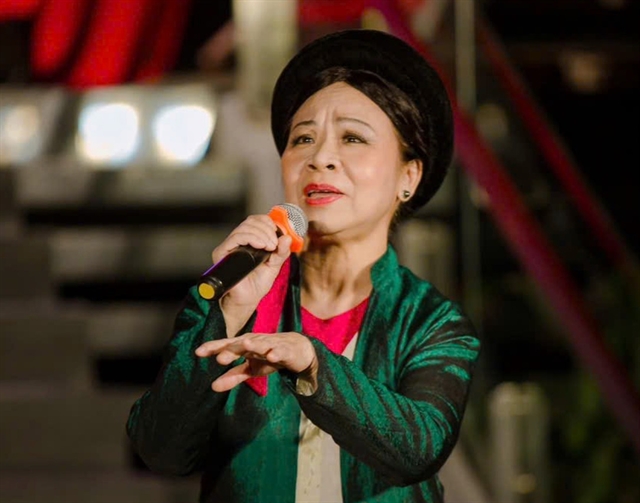 Inner Sanctum
Inner Sanctum

Hoàng Nguyên, 24, is the proud owner of Bana Bakery with the famous bánh kem sầu riêng (durian cream cake) and the author of a bakery cookbook that sells like er… hot cakes. This year he plans to write a second book containing recipes for 70 cakes and an online book on traditional Vietnamese cakes in English and Vietnamese.
 |
| Hoàng Nguyên. VNS Photo |
Hoàng Nguyên, 24, was born in a business family in the central city of Đà Nẵng and graduated from the Academy of Journalism and Communication, but chose to pursue neither career. Instead, he became a pastry chef. Now, after overcoming a myriad challenges, he is the proud owner of Bana Bakery with the famous bánh kem sầu riêng (durian cream cake) and the author of a bakery cookbook that sells like er… hot cakes. This year he plans to write a second book containing recipes for 70 cakes and an online book on traditional Vietnamese cakes in English and Vietnamese. Thu Ngân speaks to Nguyên.
Inner Sanctum: How were your early days in baking? What inspired your love for cake making?
I still remember… It was a day when I was in secondary school. My sister, who signed up for a bakery class, did not want to go alone and asked me to accompany her.
I think it was destiny.
I did a good job in that class, especially making flowers for the icing. My love for baking started at that time.
I still have memories about the days I spent my free time at bookstores reading books about baking. I learnt many receipts in English by heart right at the bookstores since I loved them so much.
Growing up, I found a job and spent money to buy foreign baking books to learn.
To get more experience, I also applied for jobs at five-star hotels.
I really fell in love with cakes. I love the creativity involved in making each cake. Cakes I think are made and decorated by bakers based on their feelings. They must be highly experienced and aware of trends.
Inner Sanctum: You graduated from the Academy of Journalism and Communication. Why didn’t you continue on this path or enter your family’s business?
My family has had a petrol trading business in Đà Nẵng since 1990. My sisters and brothers have all entered this business.
My father however wanted his last child – me – to have a different career. He realised I was good at writing since I was in grade seven and so wanted me to become a journalist.
Though my parents showed me a direction, I wanted to go on my own. I love doing business but will do it differently.
I love beauty. I love to show my creativity, so each of my cakes has a different feature. I rarely make the same cake again.
I think I can still write while doing business. On the contrary, it will be difficult for me to do business and make cakes when my main career is journalism.
I am now collaborating with some magazines. I am in charge of food columns in some newspapers and magazines.
Inner Sanctum: What difficulties did you face in the early days? Have you ever regretted your decision?
I often tell myself that if I start from scratch I will again decide to bake.
The most memorable time for me was when I learnt baking on the telephone.
I have a colleague who has many more years of experience than me. I would often ask him about how to bake. He would tell me recipes on the phone, and I would carefully note all the information in a bunch of notebooks.
After listening to him I would make the cakes, and then call him to describe how they came out.
Some days I would be lucky and on other days not, and I had to do again and again.
We exchanged all the information over phone, and I bought promotion sim cards to learn baking. That is an amazing memory.
Inner Sanctum: Your Góc Bếp Thơm Bơ has been named a top five best-selling cookbooks ever. Tell us something about it. Do you plan to write more books?
Góc Bếp Thơm Bơ was my first book. I wrote it in 2015 after a friend at a publishing house asked me.
When being asked, I though of my parents. They are a huge motivation for me. I want them to be happy seeing my success since I chose my own [career].
I had been appeared in many TV programmes and newspaper stories, but it was the first time I had written a book and I thought writing a book would help me retain all my memories.
Every time I wrote about a recipe in the book, all the memories about making that cake came flooding back. Since I wanted to show my love to the readers and all of them to understand I used the simplest language in the book. That was the biggest success of the book, I think.
The book contains recipes for 60 cakes. They are basic recipes, and based on them people can make all other cakes.
Many of my friends and readers want to buy the book now but it is always sold out. They want me to republish it but I don’t.
I am now planning to write another book about cakes made using Vietnamese materials as I want people who love baking in Việt Nam to easily find materials at affordable prices. The book is planned to be published by the end of this year.
I am also collaborating with a US publisher to write an online book on traditional cakes of Việt Nam. The book will be in Vietnamese and English.
Inner Sanctum: As a young person who achieved success in a field of your own choice, can you share your experiences for the benefit of others?
I am a perfectionist.
I always make plans in which I list goals for one year.
My perception is clear: in addition to passion, I also focus on reality so that I can always enrich my knowledge.
This perception is clearly proved in my career: when I have more knowledge, I know how to mix materials and make new kinds of cake.
When I have free time I teach young people how to bake on my page on Bana’s Cook Book. Here we study together and share experiences.
I am also planning to give free lessons at my bakery to disadvantaged young people.
Inner Sanctum: Many people say Nguyên is famous not just for baking. You are also known for your charity programmes. Can you tell us about that?
In 2013 I established the Bana Charity Group. In the initial days it was just a small group that delivered free porridge to Children’s Hospital 2. In the beginning the porridge was delivered on the first Saturday of every month. Now many other charities are doing the same, so I do it once every quarter.
About 90 per cent of the funds was from my customers and 10 per cent was from my business.
Time has gone by and the group has expanded.
My group often supports homeless elderly people and orphaned and disadvantaged children.
The others our group targets are disadvantaged families living in remote areas.
I visit disadvantaged areas during my business trips and identify families needing help. When I return home I solicit donations. VNS




